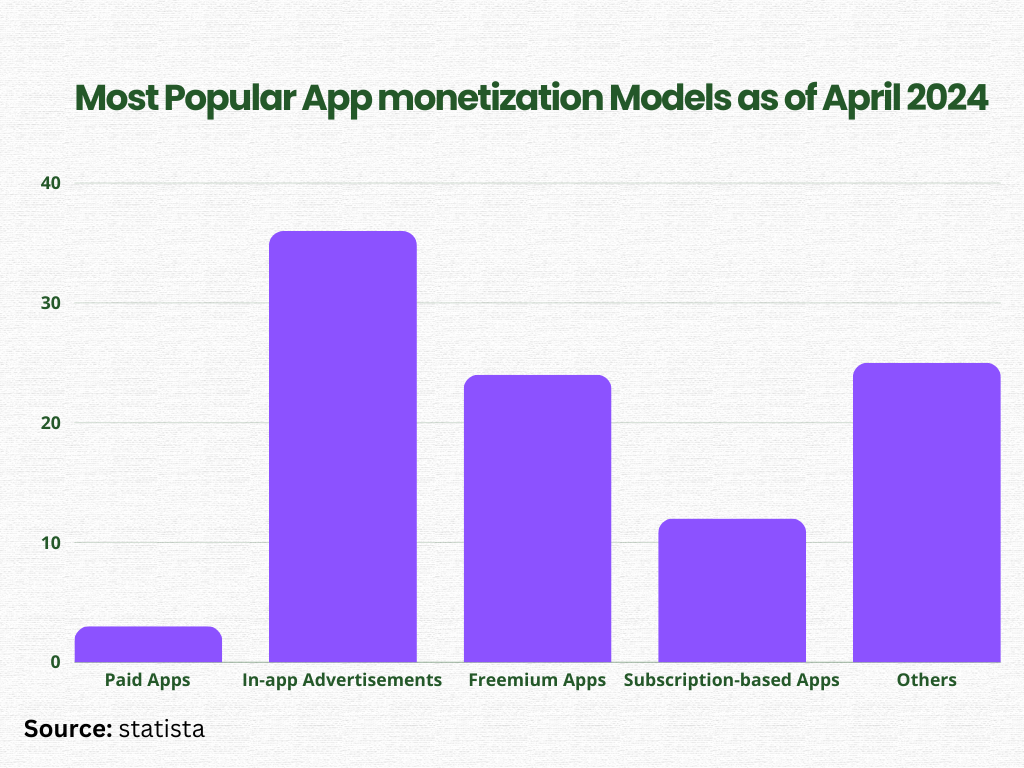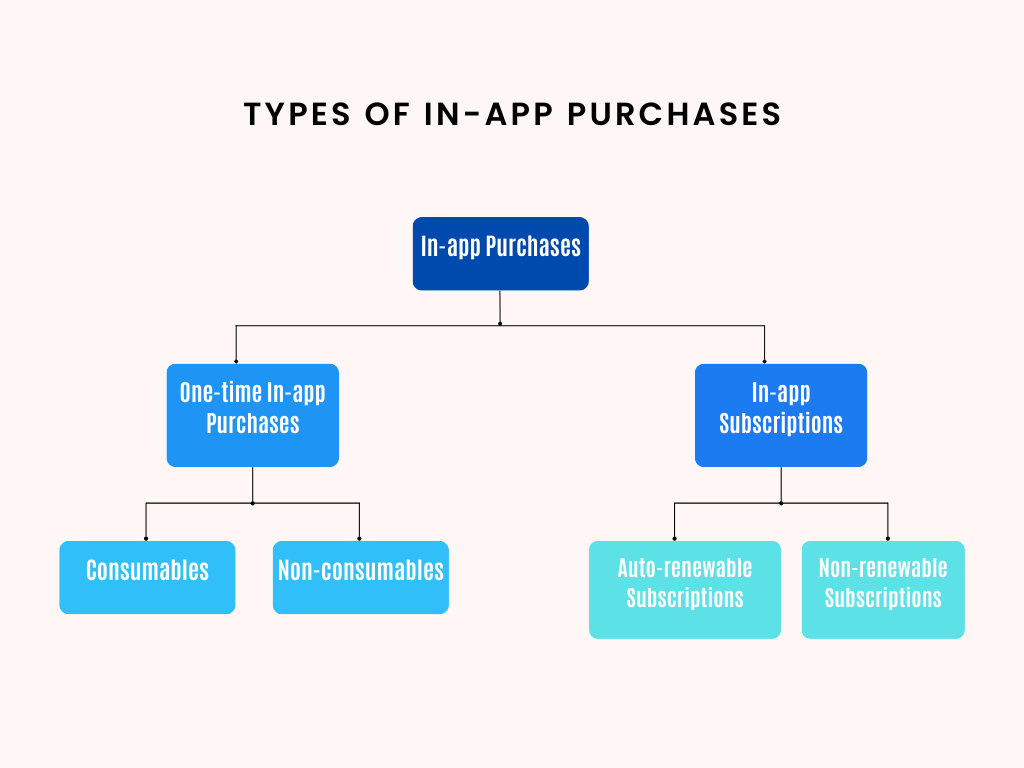2500+
Successful Projects
Table of Contents
You have finally got what you wanted - a great mobile app for your business. Now, you can interact with your customers better, and their feedback is helping you think of new and unique ways to elevate your brand. But wait! Your app is still missing something - monetization. Every business strives for high revenue and profits, and that’s their ultimate goal. They literally do everything for it, but what works in the mobile app development industry is how you choose and implement app monetization strategies.
According to research by Data.ai, the year-over-year consumer spending on apps increased by 3%, reaching $171 billion in 2023. Look - your app is more than just a tool. It offers an additional revenue stream for your business. Interested to know more about app monetization strategies? Aren’t you?
Great! By the end of this post, you will have learned some of the best app monetization strategies that can turn your business app into a money-making machine. So, let’s get started!

App Monetization refers to the process of generating revenue from your mobile app. It often involves various strategies, from displaying banner advertisements at the bottom of your app to using rewarded video ads and implementing in-app advertising techniques.
Understanding the concept of app monetization is vital, as there are many strategies that can assist app owners and advertisers in generating income. More crucially, a thoroughly researched app monetization strategy ensures that you're fostering a positive user experience, which is critical to maintaining and expanding your user base in a profitable manner.
Before the user acquisition process, it's essential to select a monetization model as it will shape your user acquisition strategy. When evaluating the most effective app monetization models to use, it's crucial to take into account the user journey and how it will impact the overall experience.
Mobile app monetization is a critical consideration for businesses, with different models impacting user privacy, experience, and the cost to the developer. The choice of monetization strategy can influence the user interface, features, and overall user experience of the app.

Here are some common mobile app monetization models:
This app monetization model, also known as the premium model, requires users to pay a one-time fee to download the app. This was once the developers' go-to strategy before others. As of 2025, 8% of apps on the Apple App Store and 4% on the Google Play Store use this model.
In this model, users make purchases within the app after installation. These in-app purchases (IAPs) can enhance the user's experience and vary based on the app category. For instance, a productivity app might offer upgrades, a fitness app might provide exclusive access, and gaming apps might sell items or unlock new levels.
In this app monetization model, users see ads from third parties while using the app. The publisher gets paid based on the specific cost model in use. One such example is rewarded video ads, where users receive a reward, such as in-app currency or level completion, for watching a full-screen ad.
The freemium model is a popular strategy where users can download and use an app at no cost. However, some features are exclusive to those who pay. Users can access these premium features or eliminate ads by making a purchase within the app or subscribing.
You will be surprised to know that over 97% of apps on the Play Store and 95% on the App Store are free. But how do they earn money? Well, they generate revenue through in-app purchases, subscriptions, and advertising.
The subscription model offers businesses a steady flow of income. Users pay a fixed subscription fee or choose from various subscription levels. This model is beneficial for apps that deliver continuous value, like news outlets, productivity tools, or entertainment platforms. It encourages user loyalty as they value the ongoing improvements and specialized services.
In the sponsorship model, app developers offer companies the chance to gain brand visibility within the app. This model is effective for apps with a large user base or those well-known in a specific market. Companies relevant to the app's user base are likely to be interested in sponsorship opportunities.
As said earlier, mobile app monetization strategies help you turn your app into a money-making machine. These are ways to earn income from your app, keeping your business going.
Here's how these strategies can help:
With our years of experience and knowledge of the mobile app development market, we have formulated 5 successful mobile app monetization strategies that can help you earn mobile from your app.
In-app ads are promotional content that users see while using an app. They come in various forms, such as banner ads, full-screen ads, video promotions, native promotions, and text-based ads. This method of generating revenue from apps is highly favored, and its popularity is still strong. In fact, forecasts suggest that by 2025, the revenue from in-app ads will nearly triple, hitting a staggering $226 billion.
The most commonly used formats for in-app advertising are banner ads, video promotions, native promotions, full-screen ads, interactive ads, and reward-based ads. Studies have shown that in-app ads on mobile websites can be up to 11.4 times more effective than banner ads.
For this strategy of monetizing mobile apps to be most effective, it's crucial to follow best practices. Ads should be placed at the bottom of your app. For instance, in a gaming app, ads should be displayed at the end of a level.
In-app purchases (IAPs) are transactions made by users within an app to access extra features, content, or benefits. They are a powerful revenue-generating tool for mobile apps, contributing to approximately 48.2% of all mobile app income.
There are two main types of IAPs:
One-time in-app purchases refer to the items that a user buys only once. They can be further divided into:
Subscriptions are a unique type of in-app purchase where a user pays a set subscription fee on a weekly, monthly, or quarterly basis (or according to a predetermined subscription cycle) for ongoing access to the benefits, features, and content that the subscription provides. In fact, a significant portion (82%) of the revenue that non-gaming apps earn on app stores actually comes from subscriptions.
Just like one-time purchases, In-app subscriptions can be of two types:
If you believe in updating your app’s content frequently, think about setting up a subscription model for your recurring customers. This way, your users just need to register for a monthly or quarterly billing cycle, and they'll get all the new content without having to remember to purchase it.
However, when you adopt the subscription model, aim to create different levels of access to your content. The Economist successfully implemented this approach by giving their users the choice of a digital-only subscription, a print-only subscription, or a combination of both.
A lot of users found it worthwhile to pay a little extra for the added benefit of having access to both digital and print subscriptions. So, when you're looking to generate revenue from your app, think about providing separate options and including a subscription package that bundles all the services together as a premium offering. This could significantly increase your app's profitability.
If none of the above models work for your app, you can try alternative app monetization strategies. Partnering with brands and sponsorships can be a profitable strategy for app monetization. In this model, brands pay to collaborate with the app, capitalizing on its user base for marketing campaigns. By smoothly incorporating brand propositions, app developers can generate an extra income source while boosting user interaction.
Sponsorships and partnerships are flexible, suitable for a wide range of app categories, and offer brands a focused platform to display their goods or services. This approach encourages reciprocal relationships, providing developers with financial backing and brands with access to a tailored audience.
Simultaneously, another excellent method to monetize apps is through affiliate marketing. This strategy allows apps to earn commissions by endorsing third-party goods or services. Developers need to embed unique affiliate links or codes within the app. When users make purchases via these links, the app earns a set percentage of the sale.
Once you've understood the various app revenue models, it's time to discuss how to gauge the effectiveness of your chosen model.
Here are the key metrics to monitor:
In your efforts to generate revenue from your mobile app, choosing the right app monetization strategy can be complex. It's challenging for businesses to use multiple techniques to maximize their app's revenue potential.
In 2023, advertisers in the US alone invested over $352.7 billion in in-app advertising, indicating a growing confidence in this particular monetization strategy within the digital advertising landscape.
When looking for an app monetization model, app owners should ponder over the following aspects:
Turning your app into a successful business requires a thoughtful approach to how you make money. But beyond the basic strategy, there's a legal and regulatory side to consider. Below are some legal and regulatory considerations in the app monetization process that ensure user protection, privacy, and fair practices.
Understanding these considerations from the start helps you avoid legal issues, fines, and – most importantly – losing user trust.
By this point, you're already aware of the significant impact a mobile application can have on your business. It provides an opportunity to broaden your brand's reach and connect with a wider audience. As highlighted in this article, it can also be a considerable source of revenue.
Every app developer should explore the most effective strategies for app monetization to achieve success. Our compilation of proven mobile app monetization strategies could be beneficial. Implement these strategies and observe your business start to generate more revenue from your app than ever before.
Keep in mind that the ideal app monetization strategies that work for us may not necessarily be the best for you and your app. The skilled team at Mtoag Technologies, specializing in enhancing app revenue, can guide you toward the best app monetization strategy. They can identify opportunities and potential pitfalls well in advance.